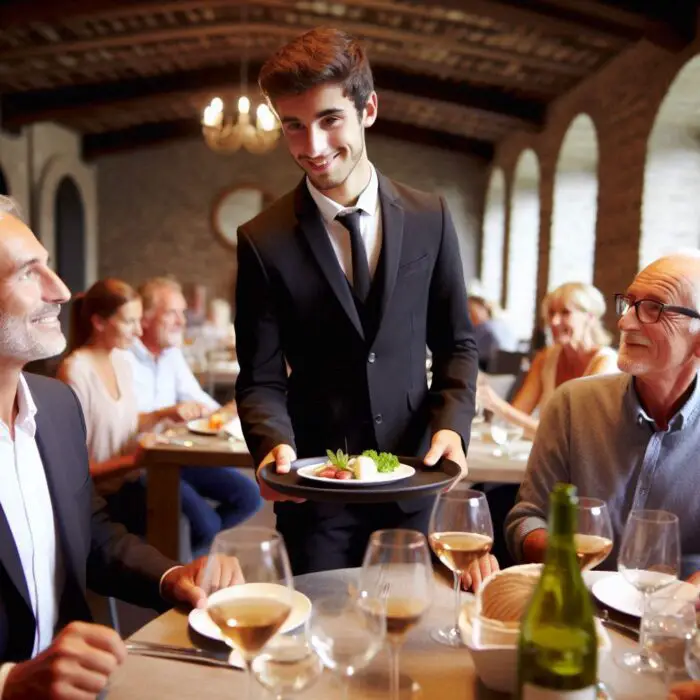
In the hospitality industry, where customer satisfaction is paramount, the ability to keep up with job tasks directly impacts trustworthiness and success.
Whether you’re working in a restaurant, event venue, or any other hospitality establishment consistently managing your responsibilities builds trust with both your employer and guests.
As hospitality professionals are often the face of the business, a reputation for reliability and dependability is essential for career growth.
In this blog post, we will explore practical ways to keep up with job tasks as a hospitality employee, fostering a strong sense of trustworthiness that can lead to long-term success in the industry.
1. Prioritize and Organize Your Daily Tasks
One of the most effective ways to stay on top of your responsibilities in the fast-paced hospitality environment is through prioritization and organization.
With multiple duties that can range from guest interactions to behind-the-scenes operations, organizing your daily tasks is crucial.
-
Create a To-Do List: Write down tasks in order of priority. Begin with high-priority tasks that affect guest experience, such as checking in guests or ensuring cleanliness, and then move to less time-sensitive responsibilities.
-
Use Time Management Tools: Digital tools like task management apps (e.g., Trello, Asana) or even a simple planner can help keep track of deadlines and reminders.
-
Set Clear Goals: Breaking larger tasks into smaller, manageable steps will help prevent feeling overwhelmed, ensuring that each task is handled properly.
2. Master Time Management
Time management is a skill that directly correlates with productivity. In hospitality, time is often in short supply, especially during peak hours. Managing your time efficiently not only ensures that tasks are completed promptly but also demonstrates your dependability.
-
Plan Ahead: Anticipate busy times (e.g., lunch hours, check-in times) and prepare accordingly by having all necessary tools and resources ready.
-
Minimize Distractions: Limit distractions when focusing on tasks that require immediate attention, such as guest requests or completing daily reports.
-
Avoid Multitasking: While it may seem tempting to juggle several tasks at once, multitasking can lead to errors and decreased productivity. Instead, focus on completing one task before moving on to the next.
3. Communicate Effectively with Your Team
Effective communication is key to maintaining productivity and trustworthiness in any hospitality setting. Your ability to stay on task often depends on collaborating efficiently with your team and managers.

-
Clarify Expectations: If you’re unsure about certain duties or tasks, don’t hesitate to ask for clarification. Clear communication ensures you know what is expected of you.
-
Check-In Regularly: Touch base with your supervisor and colleagues to ensure that everyone is on the same page, especially when handling group tasks or shifts.
-
Share Updates: Keep your team informed of any issues or progress that might impact the workflow. Regular updates show accountability and reliability.
4. Build Systems for Repetitive Tasks
Many hospitality roles involve repetitive tasks, such as processing guest requests, cleaning rooms, or managing inventories.
Creating systems or routines for these duties helps streamline the process, allowing you to complete them quickly and accurately.
-
Standard Operating Procedures (SOPs): Follow established guidelines to maintain consistency. This ensures tasks are performed efficiently and up to standard every time.
-
Automate Where Possible: If your role involves repetitive data entry or reporting, use digital tools or software that can automate parts of these tasks, reducing errors and saving time.
-
Develop a Routine: For tasks like housekeeping or restaurant prep work, establish a routine so you’re always clear on what needs to be done next. This will help build efficiency and trustworthiness.
Chart: Key Habits to Build Trustworthiness in Hospitality
| Habits | Action | Benefit |
|---|---|---|
| Prioritize Tasks | Use lists or apps to organize tasks by urgency | Ensures essential duties are completed first |
| Communicate Clearly | Regular check-ins with team members | Reduces confusion and improves teamwork |
| Master Time Management | Plan and focus on one task at a time | Increases productivity and prevents burnout |
| Build Routines for Repetitive Tasks | Establish consistent systems for daily duties | Saves time and improves task efficiency |
| Seek Feedback | Regularly ask for feedback on performance | Helps identify areas of improvement |
5. Seek Feedback and Continuously Improve
A key part of being trustworthy in the workplace is actively seeking feedback and making continuous improvements based on that input.
Being open to suggestions and demonstrating a willingness to improve shows that you are committed to excellence and growth.
-
Ask for Feedback: Regularly check in with your supervisors or colleagues for constructive feedback on your performance. This not only helps you improve but also signals to your employer that you value their opinion.
-
Act on the Feedback: Once you receive feedback, work on areas where improvement is needed. Whether it’s improving your time management or enhancing customer interactions, showing progress can build trust with your team and management.
-
Stay Updated on Industry Trends: Staying current with hospitality trends and technology, such as customer service improvements or the latest booking systems, will help you remain competitive and efficient in your role.
6. Anticipate and Exceed Guest Expectations
In the hospitality industry, going above and beyond for your guests can set you apart as a reliable and trustworthy employee.
Anticipating guest needs and delivering exceptional service ensures guest satisfaction and builds your reputation.
-
Pay Attention to Details: Guests appreciate employees who notice and respond to small details, whether it’s offering extra towels or remembering their dining preferences.
-
Be Proactive: Don’t wait for guests to ask for help; anticipate their needs and offer assistance before they request it. This not only enhances their experience but also establishes you as dependable.
-
Follow Through: If you promise a guest something — whether it’s a request for room service or a reservation — ensure that you follow through promptly.
FAQ: Maintaining Trustworthiness in Hospitality Jobs Q: How can I manage my time effectively in a busy hospitality environment? A: Focus on prioritizing tasks, avoiding multitasking, and planning for busy periods to improve your efficiency. Q: What can I do to stay organized with multiple job duties? A: Use tools like to-do lists or task management apps to keep track of your responsibilities and ensure nothing falls through the cracks.
Q: How do I maintain good communication with my team? A: Regularly check in with your team, clarify expectations, and keep everyone updated on your progress to foster strong communication.
Conclusion
Keeping up with job tasks as a hospitality employee requires a mix of organization, time management, communication, and a proactive mindset.
By prioritizing tasks, mastering routines, and constantly seeking ways to improve, you not only build trust with your team and guests but also pave the way for career growth.
Trustworthiness is earned through consistent effort, and in the hospitality industry, it’s the foundation of a successful and rewarding career.
Author
-

Benedict Ohia is a seasoned chef with over 15 years of experience in the culinary industry. Passionate about food, innovation, and mentoring others, Benedict combines his chef expertise with his storytelling talent as the founder of CatererCareers.com. Through his niche website, he provides invaluable insights, tips, and resources for aspiring chefs, caterers, and hospitality professionals. Whether guiding career growth or sharing industry trends, Benedict is dedicated to inspiring others to succeed in the dynamic world of catering and culinary arts.
View all posts




